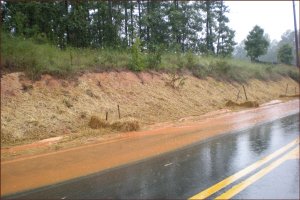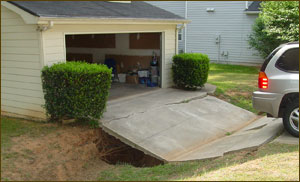For service in the Atlanta, Georgia area contact or call us:
Forensic Hydrology
Forensic hydrology is applying scientific knowledge of storm water to legal resolutions. Hydrologists evaluate and document damage caused by water and presents the information in court.
Forensic Hydrologist

Forensic hydrologists evaluate damages caused by water and determine the source of the water that caused the damage.
A detail investigation and analysis is performed which involves collecting site specific data, analyzing topography maps, performing calculations and hydrologic modeling.
Many years of training and case work is required to become a Professional Hydrologists (PH). Extensive testing is required by the American Institute of Hydrology before a certification is issued.
In forensic hydrology, the PH uses this knowledge to determine causation. This is followed by a final report, depositions and later court testimony.
The laws which affect storm water runoff is changing. Professional Hydrologist must keep abreast of the changes in local laws as well as state and federal laws.
Types of Storm Water Cases
Our Professional Hydrologists work with attorneys in many areas to identify and evaluate problems concerning:
- Storm water flooding
- Surface water drainage
- Undersized storm water conveyance channels such as pipes and ditches
- Clogged or inadequately maintained storm drains
- Water damage to houses built at lower elevation
- Storm water yard drainage issues
- Soggy, wet yards
- Basement water damage
- Crawl space water damage
- Malfunctioning detention ponds
- Contaminated drinking water supplies
- Siltation of streams, lakes and waterways
- Damaged habitats in streams
- Yard erosion
- Improper or lack of BMPs such as silt fence, rip rap, temporary sediment basins, etc.
- Sink holes
- Roadway defects and roadway surface water drainage problems
- Hydroplaning of vehicles
Litigation Support
Whether it is the need to evaluate the size of a storm water piping system, a detention pond system or a diversion ditch channel, our forensic hydrologists have the skills and expertise to determine the source of the problem and to explain forensic hydrology issues to the judge and jury.
Atlanta Engineering Services provides litigation support in hydrology and hydraulic matters for clients in court cases involving flooding, property damage caused by storm water and improper release of storm water.
Land Development

Sink Holes and unimproved property which is developed into impervious areas such as parking lots and buildings increases the amount of storm water runoff and also increases the rate of runoff of the storm water. Rain water that once soaked into the undeveloped wooded terrain now races across streets and parking lots at a much faster rate.
The increase in the volume and the rate of runoff must be routed into impounding detention structures for release of the water at pre-development rates. An improperly designed or constructed storm water system causes damage to downstream property owners.
The methodology used in forensic hydrology is essential in determining design and construction defects. The Federal Government promulgated The Clean Water Rules and Regulations to address the quantity of storm water discharge and also the quality of the storm water released onto adjacent property.
Local governments have further enacted laws to regulate the discharge of storm water from newly developed sites. These laws are intended to protect downstream property owners as well as downstream lakes, rivers and streams.
Storm Water Runoff Evaluation
Professional hydrologists and engineers design storm water systems to safely convey storm water to its discharge point and release the storm water in a nondestructive manner.
Forensic hydrologists advise property owners in the analysis of all types of storm water damage cases. Upon the occurrence of storm water damage, forensic hydrology sciences are used in analyzing each storm water runoff situation.
Erosion & Sediment Pollution
Our engineers and hydrologists are also certified as erosion and sediment control specialists and provide expert testimony in the release of erosion and siltation from construction sites.
Because of the erosion and sedimentation regulations, states have produced erosion control manuals used to implement Best Management Practices (BMP) for soil disturbance construction activities. These BMPs are specified by engineers and hydrologists are used by contractors to minimize release of siltation during construction.
Atlanta Engineering Services

Elvin Aycock at Atlanta Engineering Services is a Professional Hydrologist. He has been practicing forensic hydrology for more than 20 years.
Elvin is also a professional engineer, a professional land surveyor and is ACTAR certified. He is uniquely qualified to provides expert testimony involving storm water damage and hydroplaning.
A successful erosion control plan takes into account buffers, state waters and other downstream properties that might be affected by the development of your property. Call now to have our experts appraise your situation.
Additional Stormwater Drainage Information:
Find a Drainage Specialist for consultation
Yard Drainage Problems Devalues Property
Simple Solutions to Residential Drainage Problems
Learn the Benefits of Stormwater Drainage Swales
Solving Wet, Soggy Yard Problems
Common Drainage Problems of Homeowners
Preventing Crawl Space Drainage Issues
Do I have a Groundwater Spring on my Property?
Stormwater Damage from the Property Above
Stormwater Utilities and Detention Ponds
Forensic Hydrologist Evaluates Stormwater Runoff
Hydrology Expert Contact Information
Additional Services by Atlanta Engineering Services
G-ZNJ8QW23K9